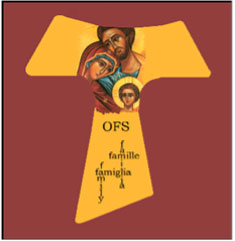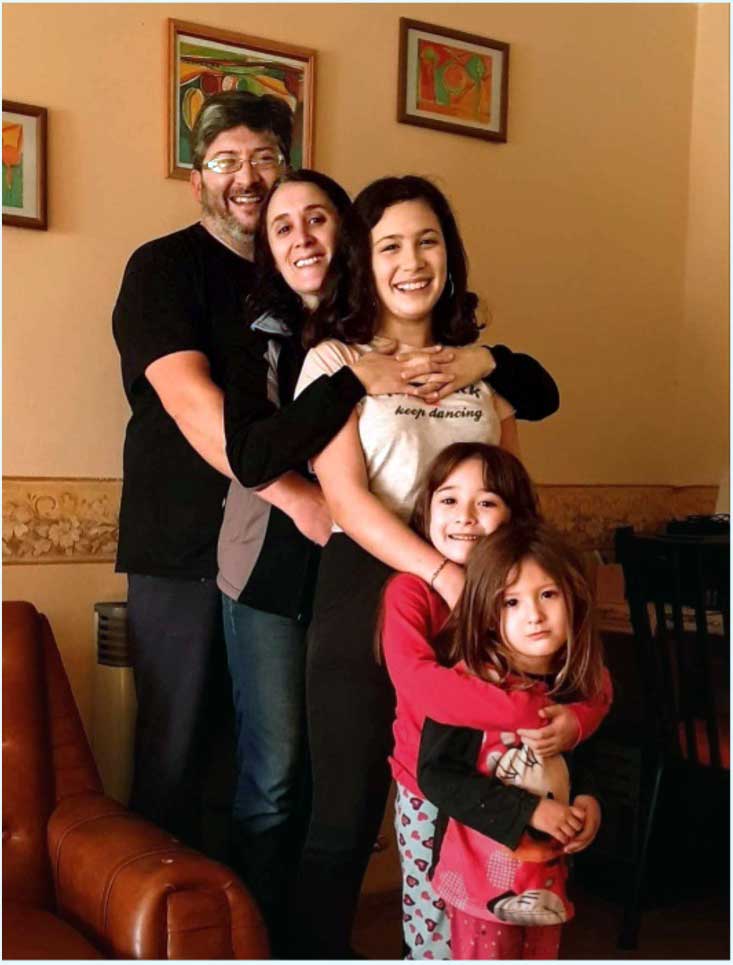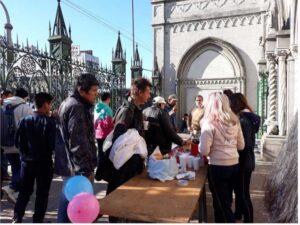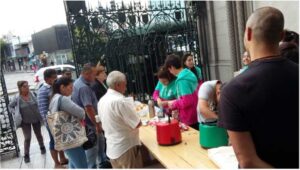The Family Commission wishes to propose the following theme for the fraternities, keeping in mind the great challenges that we are facing today.
THE FAMILY AND CARING FOR OUR COMMON HOME
 Ordo Franciscanus Saecularis
Ordo Franciscanus Saecularis
Consilium Internationale
FAMILY COMMISSION
Silvia Diana OFS
Translation: Mary Stronach, OFS
The Family Commission wishes to propose the following theme for the fraternities, keeping in mind the great challenges that we are facing today.
THE FAMILY AND CARING FOR OUR COMMON HOME
Our Pope Francis tells us:
“LAUDATO SI’, mi’ Signore” – “Praise be to you, my Lord.” In the words of this beautiful canticle, Saint Francis of Assisi reminds us that our common home is like a sister with whom we share our life and a beautiful mother who opens her arms to embrace us. “Praise be to you, my Lord, through our Sister, Mother Earth, who sustains and governs us, and who produces various fruit with coloured flowers and herbs”.
This sister now cries out to us because of the harm we have inflicted on her by our irresponsible use and abuse of the goods with which God has endowed her. We have come to see ourselves as her lords and masters, entitled to plunder her at will. The violence present in our hearts, wounded by sin, is also reflected in the symptoms of sickness evident in the soil, in the water, in the air and in all forms of life. This is why the earth herself, burdened and laid waste, is among the most abandoned and maltreated of our poor; she “groans in travail” (Rom 8:22). We have forgotten that we ourselves are dust of the earth (cf. Gen 2:7); our very bodies are made up of her elements, we breathe her air and we receive life and refreshment from her waters. ( Encyclical Laudato Si 1-2)
Our Rule tells us:
Moreover they should respect all creatures, animate and inanimate, which “bear the imprint of the Most High”, and they should strive to move from the temptation of exploiting creation to the Franciscan concept of universal kinship. (OFS Rule 18)
“The reasons for the current serious problems of environmental deterioration are complex, but one of the main causes is undoubtedly the current model of unfair and predatory economic development.
The economic system underlying the North-South divide is also the cause of the exploitation of nature. With their consumer lifestyle, rich countries attack the environment, reduce its resources and produce a quantity of waste that the environment cannot absorb. Even poor countries use their resources to fight the misery in which they live. They are responsible for all this — not just the governments and international and transnational organizations, but also the citizens who, leading a consumerist life, reinforce this model of development and consumption.
Therefore, it is necessary to change the current development model in favor of sustainable development.
To change the manner in which we produce and consume by replacing it with truly sustainable models, it is also necessary to change our lifestyle, our daily behavior that, sometimes even unconsciously, is contributing to the deterioration of the environment.
Therefore, we would like to focus now on this last aspect. We want to review the impact that our individual lives and our communites have on the environment so that we might take measures that allow us to improve our relationship with it.”
But we, Franciscans, are also part of civil society, and this influences our lifestyle choices: some are good and sustainable, others are not. To make our lifestyle more sustainable, and because we respect creation and truly care for it, we must transmit the values of our Franciscan spirituality to today’s world.
But how do we do it? What is our contribution to a sustainable lifestyle and what are the possibilities for concrete change? What must we change in our lives for things to really improve?”
(The Safeguarding of Creation in the Daily Life of the Friars Minor. Office of Justice, Peace and Integrity of Creation, Rome 2011.)
•••
Let’s work together in fraternity following our methodology: Look, Judge, and Act.
Look:
In this section we are going to read about two life experiences to help us reflect on the topic:
Family and Concrete Actions, Alejandro Natali, OFS
I am Alejandro, OFS and I live in Junin (a city in the province of Buenos Aires in East Central Argentina). My wife is María Eugenia and we have three daughters: María del Pilar, Valentina and Belén. We live in an apartment which, although comfortable and spacious, has, as its only open space a balcony of 3 by 1 meters.
 Caring for our common home is an issue that involves all of us, regardless of whether or not we take actions to take care of it. In our particular case, there are things that we do individually, and others as a Family. I recognize that there are many things that can be done in a home, but often they are not done because they are inconvenient, other times because of ignorance, and other times because we do not have the tools and a suitable place for said actions. For example, in our home, the waste must be discarded in bags, since otherwise it would become messy and would produce a lot of odor. Therefore, even knowing that bags take many years to decompose, it is not possible to stop using them. We use organic waste to make compost, but only a small part, since, as I said before, we only have a small balcony, and we make compost in pots, and then we use it for decorative plants and some plants that produce edible fruits (tomatões, peppers, etc.) Another actions that is carried out at home (in fact, specifically by María Eugenia) is making ecological bricks. It’s a process by which we fill plastic bottles with nylon or plastic-based papers, which are then taken to collection centers to be recycled. We also reuse jam jars (and other product jars) to make souvenirs, pen holders and for other purposes. We also reuse plastic containers for flowerpots and seedlings, among other uses.
Caring for our common home is an issue that involves all of us, regardless of whether or not we take actions to take care of it. In our particular case, there are things that we do individually, and others as a Family. I recognize that there are many things that can be done in a home, but often they are not done because they are inconvenient, other times because of ignorance, and other times because we do not have the tools and a suitable place for said actions. For example, in our home, the waste must be discarded in bags, since otherwise it would become messy and would produce a lot of odor. Therefore, even knowing that bags take many years to decompose, it is not possible to stop using them. We use organic waste to make compost, but only a small part, since, as I said before, we only have a small balcony, and we make compost in pots, and then we use it for decorative plants and some plants that produce edible fruits (tomatões, peppers, etc.) Another actions that is carried out at home (in fact, specifically by María Eugenia) is making ecological bricks. It’s a process by which we fill plastic bottles with nylon or plastic-based papers, which are then taken to collection centers to be recycled. We also reuse jam jars (and other product jars) to make souvenirs, pen holders and for other purposes. We also reuse plastic containers for flowerpots and seedlings, among other uses.
Change is difficult but it is not impossible, and it is necessary to make the change – for us, but above all, for our children, since they are the direct beneficiaries when we care for our common home. It is also a way of educating them, so that they themselves become aware and “get used to” taking care of our common home with our small daily actions.
Solidarity Students, Committed Families. Guadalupe Romero, OFS and Franciscan Teacher.

At the entrance to the school where I work, there is a sign that says “Green School.” At the beginning, the sign referred to a project that was linked to separating of waste. Little by little, the concept “green” began to include different realities. We began to look a little beyond the institute’s campus; we discovered people living on the streets. The students in their final year, together with pastoral leaders, organized a breakfast room for these brothers and sisters that functioned for many years at the door of the Pompeii Shrine on Tuesdays. This proposal not only dealt with “feeding the hungry” but also made it possible to link several Brothers/sisters with other services provided by the Social Pastoral Office at the Shrine. Some returned to get their identity card, others managed to get retirement, some got accommodations for the nights … What I remember most about that experience is the meeting of the gazes… the eyes of the students meeting those of the brothers, and their orphanhood mutated for a while, and they were all one big family. They stopped being a statistic for us and became real brothers/sisters, real names, real stories that were intertwined with our own history.

Behind every student’s the family. Upon learning of the project, many started to collaborate to support the breakfast room materially with their donations. You would see the grandmothers’ cakes, the mothers’ pancakes, the coffee bought at wholesale prices at the uncle’s store, etc. and some of the parents stopped by to see their children’s work when their work hours would permit it.
At the end of the course the students left the school and started a new stage in their lives. They took with them the challenge to keep widening their gaze. They learned not to be afraid, to approach those suffering, to extend their hand, to be the bridge.
The pandemic stalled this project. I am certain that we will bring it back soon.
At any rate, we are already making new plans. In recent days God has directed our gaze toward the basin of Riachuelo, the most contaminated river in the city of Buenos Aires. It is about 700 meters away from the school. We have already gotten in contact with some organizations that are working to clean up these waters.
Humbly, we ask ourselves what is the challenge that we can accept as an educational community. We still do not have the answer. But we are certain of some things:
- Experience shows us that the school is the place where great social changes are made.
- No change occurs from one day to the next. It brews day by day. It thrives on collective experience.
- It is precisely that collective experience that begins in the classrooms that opens each family’s door.
- A school that embraces the ecological commitment promotes families commited to the care of our common home.
The pandemic does not stop us, it gives us power. Peace and All Good!
•••
JUDGE:
Let us learn more with the following documents:
- The urgent challenge to protect our common home includes a concern to bring the whole human family together to seek a sustainable and integral development, for we know that things can change. The Creator does not abandon us; he never forsakes his loving plan or repents of having created us. Humanity still has the ability to work together in building our common home. Here I want to recognize, encourage and thank all those striving in countless ways to guarantee the protection of the home which we share. Particular appreciation is owed to those who tirelessly seek to resolve the tragic effects of environmental degradation on the lives of the world’s poorest. Young people demand change. They wonder how anyone can claim to be building a better future without thinking of the environmental crisis and the sufferings of the excluded.
- I urgently appeal, then, for a new dialogue about how we are shaping the future of our planet. We need a conversation which includes everyone, since the environmental challenge we are undergoing, and its human roots, concern and affect us all. The worldwide ecological movement has already made considerable progress and led to the establishment of numerous organizations committed to raising awareness of these challenges. Regrettably, many efforts to seek concrete solutions to the environmental crisis have proved ineffective, not only because of powerful opposition but also because of a more general lack of interest. Obstructionist attitudes, even on the part of believers, can range from denial of the problem to indifference, nonchalant resignation or blind confidence in technical solutions. We require a new and universal solidarity. As the bishops of Southern Africa have stated: “Everyone’s talents and involvement are needed to redress the damage caused by human abuse of God’s creation”. [22]All of us can cooperate as instruments of God for the care of creation, each according to his or her own culture, experience, involvements and talents.
ENCYCLICAL LAUDATO SI
- I would like especially to mention solidarity, which, “as a moral virtue and social attitude born of personal conversion, calls for commitment on the part of those responsible for education and formation. I think first of families, called to a primary and vital mission of education. Families are the first place where the values of love and fraternity, togetherness and sharing, concern and care for others are lived out and handed on. They are also the privileged milieu for transmitting the faith, beginning with those first simple gestures of devotion which mothers teach their children. Teachers, who have the challenging task of training children and youth in schools or other settings, should be conscious that their responsibility extends also to the moral, spiritual and social aspects of life. The values of freedom, mutual respect and solidarity can be handed on from a tender age… Communicators also have a responsibility for education and formation, especially nowadays, when the means of information and communication are so widespread”.
ENCYCLICAL FRATELLI TUTTI.
- Nature holds a special attraction for many adolescents and young people who recognize our need to care for the environment. Such is the case with the scouting movement and other groups that encourage closeness to nature, camping trips, hiking, expeditions and campaigns to improve the environment. In the spirit of Saint Francis of Assisi, these experiences can be a real initiation into the school of universal fraternity and contemplative prayer.
POST-SYNODAL APOSTOLIC EXHORTATION CHRISTUS VIVIT
ACT:
Questions for reflection in the Fraternity:
- Let us confirm together the impact that we have on our environment because of our current family lifestyle.
We propose that we analyze eight areas of daily life, knowing that the proposals can have differenct applications in different parts of the world. This does not mean that all must be analyzed at the same time. Rather, it is better to start with those that you consider the most impactful to lifestyles. The points that can be analyzed for dialogue are:
- water
- energy
- waste, residue
- paper, batteries, toxic substances
- transportation
- food
- consumption
- liturgy & prayer
- After the analysis, the Fraternity will prepare a realistic program to improve the care of our common home in our family lives that will be evaluated periodically to be able to address these new challenges.
A PRAYER FOR OUR EARTH
All-powerful God, you are present in the whole universe
and in the smallest of your creatures.
You embrace with your tenderness all that exists.
Pour out upon us the power of your love,
that we may protect life and beauty.
Fill us with peace, that we may live
as brothers and sisters, harming no one.
O God of the poor,
help us to rescue the abandoned and forgotten of this earth,
so precious in your eyes.
Bring healing to our lives,
that we may protect the world and not prey on it,
that we may sow beauty, not pollution and destruction.
Touch the hearts
of those who look only for gain
at the expense of the poor and the earth.
Teach us to discover the worth of each thing,
to be filled with awe and contemplation,
to recognize that we are profoundly united
with every creature
as we journey towards your infinite light.
We thank you for being with us each day.
Encourage us, we pray, in our struggle
for justice, love and peace.

